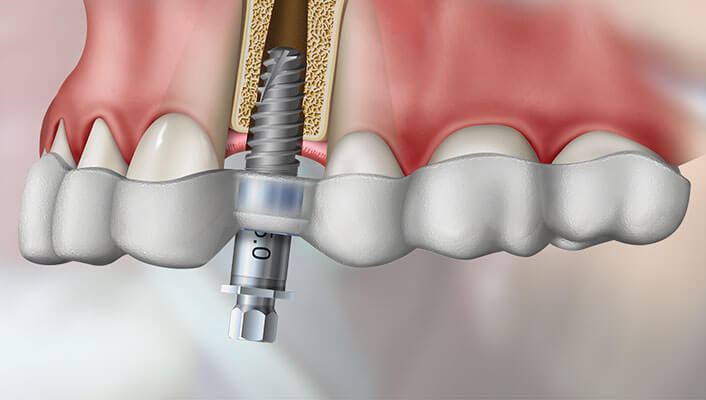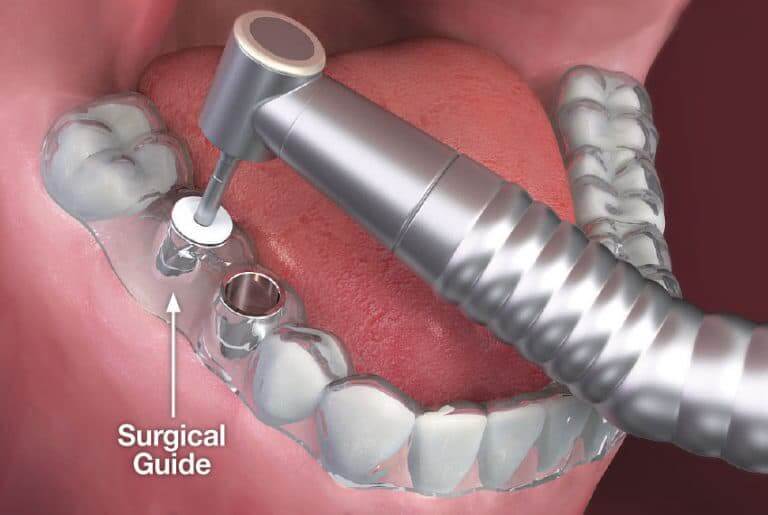Computer Guided Dental Implant Surgery

What Is Computer Guided Dental Implant Surgery?
Computer guided dental implant surgery is a modern, high-tech procedure that uses advanced computer software and 3D imaging to precisely plan and place dental implants. Unlike traditional methods, which rely mainly on the dentist’s judgment during surgery, this technique allows for a highly customized treatment based on your unique oral anatomy.
The process begins with a Cone Beam Computed Tomography (CBCT) scan, which creates a detailed 3D image of your jaw and surrounding structures. This allows the dentist to analyze bone quality, available space, and even predict the final aesthetic result before the procedure starts. With this information, the entire implant placement is meticulously mapped out in advance, ensuring accuracy and minimizing complications.
A custom-made surgical guide, based on the virtual model, is used during the procedure. This guide ensures that the implants are placed at the correct angle and depth, making the surgery more predictable and precise. This method reduces trauma to surrounding tissues, which leads to less discomfort and a faster recovery time for patients.
Before you deciding on whether Computer Guided Dental Implant Surgery are right for you, there are some things you should know:
- Who Should Consider Computer Guided Dental Implant Surgery?
- Benefits Of Computer Guided Dental Implant Surgery
- How Much Does Computer Guided Dental Implant Surgery Cost?
- Steps In The Computer Guided Dental Implant Surgery Procedure
- Frequently Asked Questions About Computer-Guided Dental Implant Surgery
If you have any further questions about Computer Guided Dental Implant Surgery or other dental services offered at Atlas Dental, please contact us.

Free phone consultation
Have questions about computer guided dental implants? Schedule a free phone consultation with our Toronto dentist.

5 star google reviews
Our patients love us! See for yourself why people are choosing Atlas Dental in Toronto for surgically guided dental implants.

Dental Implant Emergency service
Broke a tooth and need a dental implant? Book an emergency appointment today.
Who Should Consider Computer Guided Dental Implant Surgery?
While traditional implant surgery remains effective, computer guided implant surgery is especially beneficial in specific cases, including:
- Complex cases: Patients with significant bone loss or complex oral anatomy benefit from the detailed planning that computer-guided surgery offers, ensuring successful implant placement even in challenging situations.
- Multiple missing teeth: For patients requiring several implants, this method ensures proper alignment and spacing of the implants, optimizing both function and appearance.
- Limited bone volume: The ability to identify areas with sufficient bone density improves the likelihood of successful implant integration for patients with low bone density.
- Minimally invasive preferences: This technique reduces the need for large incisions, resulting in less tissue manipulation and quicker recovery times.
- Dental anxiety: Patients with dental anxiety may find comfort in the precision and shorter treatment times, which reduce stress and chair time.
- Faster treatment timeline: By pre-planning the surgery, dentists can streamline the process, saving time during the actual procedure and reducing the need for multiple visits.
- Aesthetic concerns: For patients concerned about how their smile will look, this method allows dentists to plan for optimal aesthetics, especially in the front teeth.
The decision to opt for computer guided surgery is typically made collaboratively between the patient and the dental professional, considering the patient’s unique oral health needs, preferences, and the complexity of the case. If you have further questions about Computer Guided Dental Implant Surgery, please contact us.

Benefits Of Computer Guided Dental Implant Surgery
Here are the key benefits of choosing computer guided dental implant surgery:
- Enhanced accuracy: The use of 3D imaging ensures each implant is placed with pinpoint precision, reducing the risk of complications and improving long-term success.
- Personalized treatment: Every step is tailored to your specific needs, increasing the likelihood of a successful and aesthetic outcome.
- Minimally invasive: Smaller incisions lead to less trauma, reduced discomfort, and quicker recovery times.
- Predictable results: By planning the surgery beforehand, dentists can anticipate challenges, making the procedure more predictable and efficient.
- Reduced chair time: Pre-planning simplifies the surgery, which often leads to shorter procedures and less time spent under anesthesia.
- Quicker recovery: The reduced trauma to surrounding tissues means patients typically heal faster with less post-operative discomfort.
- Improved safety: Detailed 3D scans allow the dentist to identify potential issues before surgery, enhancing overall patient safety.
Patients seeking dental implant solutions can confidently explore computer guided surgery as an excellent option for restoring their smiles with lasting results. If you have further questions about Computer Guided Dental Implant Surgery, please contact us.
Cost of Computer Guided Dental Implant Surgery
The cost of Computer guided dental implant surgery is the cost of the dental implant procedure (starting at $4165), plus CBCT scan ($234-399), plus surgical template (approximately $438). The codes relevant to Computer guided dental implant surgery in the Ontario Dental Association’s Suggested Fee Guide appear as follows:
Radiographs, Cone Beam Computerized Tomography (CBCT), Acquisition, Processing and Interpretation
- 07041 – Small field of view (e.g. sextant or part of, isolated temporomandibular joint): $234
- 07042 – Large field of view (1 arch): $315.90
- 07043 – Large field of view (2 arches): $399
TEMPLATE SURGICAL (includes diagnostic wax-up. Also used to locate and orient osseo-integrated implants)
- 03001 – Maxillary Template: $218 + Dental Lab Fee (approximately $220)
- 03002 – Mandibular Template: $218 + Dental Lab Fee (approximately $220)
Implants, Osseointegrated, Root Form, More than one component
- 79931 – Surgical Installation of Implant with Cover Screw – per implant: $1785+ Dental Materials Expense (approximately $350)
Crowns, Porcelain/Ceramic/Polymer Glass Fused to Metal
- 27215 – Crown, Porcelain/Ceramic/Polymer Glass Fused to Metal Base, Implant-Supported: $1280 + Dental Lab Fee and Dental Materials Expense (approximately $750)
Depending on your unique circumstance, implant surgery may be more difficult and more expensive if any of the following is required:
Computer guided dental Implant surgery is oftentimes considered a supplementary service by dental insurance plans and may or may not be covered by your dental insurance. Be sure to find out from your dental insurance plan provider how much you are eligible for before going ahead with dental treatment. Your dentist can help you submit a predetermination to your dental insurance.
For patients without dental insurance, Atlas Dental is pleased to offer dental financing through iFinance Dentalcard. Affordable payment plans start at 7.95% for terms of 6 months to 6 years. To learn more about Dentalcard dental treatment financing, follow this link.
Steps In The Computer Guided Dental Implant Surgery Procedure
Here’s a breakdown of the typical steps in a computer guided dental implant surgery:
- Consultation and CBCT scan: The process begins with a comprehensive evaluation and a 3D scan of your jaw.
- Virtual treatment planning: Using the 3D scan, the dentist creates a detailed, virtual plan for the implant placement.
- Surgical guide creation: A custom surgical guide is made to ensure the precise placement of the implants.
- Surgery: The dentist follows the surgical guide to place the dental implants with minimal tissue disruption.
- Recovery: With minimal invasiveness, most patients experience a quicker and more comfortable recovery.
The process, guided by state-of-the-art technology and the expertise of dental professionals, ensures a more comfortable and successful dental implant journey for individuals seeking a long-lasting solution for missing teeth. If you have further questions about Computer Guided Dental Implant Surgery, please contact us.
Frequently Asked Questions About Computer-Guided Dental Implant Surgery
- How is computer-guided implant surgery different from traditional methods?
It uses 3D imaging and surgical guides to ensure precise implant placement, improving accuracy and reducing complications.
- Is computer-guided surgery less invasive?
Yes, it requires smaller incisions, resulting in less discomfort and faster recovery times.
- Who is a good candidate for computer-guided implant surgery?
Patients with complex oral anatomy, significant bone loss, or dental anxiety benefit most from this technique.
- Does computer-guided surgery improve implant success rates?
Yes, the precision of this method reduces errors, increasing the long-term success of implants.
Computer-guided dental implant surgery offers a cutting-edge, precise solution for replacing missing teeth with greater safety and comfort. If you have further questions about Computer Guided Dental Implant Surgery, please contact us.

